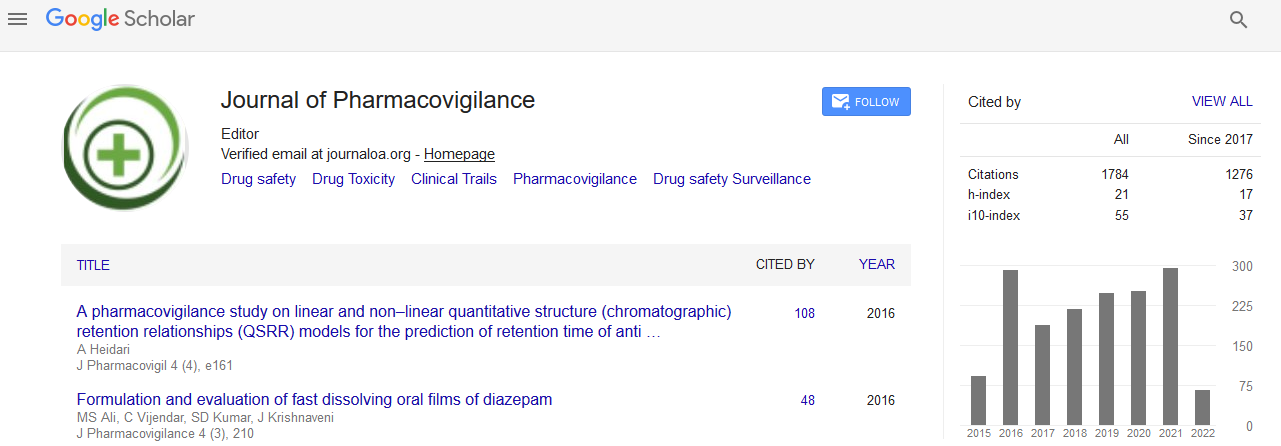Indexed In
- Open J Gate
- JournalTOCs
- The Global Impact Factor (GIF)
- RefSeek
- Hamdard University
- EBSCO A-Z
- OCLC- WorldCat
- Publons
- Euro Pub
- Google Scholar
Useful Links
Share This Page
Journal Flyer

Open Access Journals
- Agri and Aquaculture
- Biochemistry
- Bioinformatics & Systems Biology
- Business & Management
- Chemistry
- Clinical Sciences
- Engineering
- Food & Nutrition
- General Science
- Genetics & Molecular Biology
- Immunology & Microbiology
- Medical Sciences
- Neuroscience & Psychology
- Nursing & Health Care
- Pharmaceutical Sciences
The role of cognition function assessment in pharmacovigilance
2nd International Conference and Exhibition on Pharmacovigilance & Clinical Trials
November 18-19, 2013 Hilton San Antonio Airport, TX, USA
Keith A. Wesnes
Keynote: J Pharmacovigilance
Abstract:
Cognitive function plays a crucial part in quality of life, work productivity, and everyday safety. While some important monitoring of cognitive function is conducted in Phase I to III trials, mostly with CNS acting compounds; a crucial opportunity for cognition assessment is when new compounds reach the market. As with many unwanted effects of new medications, such effects may only become evident when large numbers of patients are exposed to treatment. Further, the ideal opportunity to determine whether a product is truly free of unwanted long-term cognitive side effects is in the post-approval period. In Phases I to III, cognitive testing is conducted in clinics and research centers, requiring paperwork and/or equipment as well as skilled and/or trained test administrators. Such procedures are cumbersome in Phase IV which may account for the limited amount of cognitive testing which is currently undertaken in the post-approval period, even for compounds with a known capability of compromising cognitive function. This paper will describe a computerised cognitive test system which has been used in approaching 1400 clinical trials over the past 30 years. The test system has been internet enabled, and studies have been successfully conducted via this route. In a recent validation study over 120,000 individuals aged 4 to 107 logged on remotely from home or work; data being successfully gathered from 92.5% of the sample. The patterns of age- and genderrelated differences on assessments of attention, information processing and memory, matched closely that seen with 1:1 administration of the same tests in clinical trials. Pharmacovigilance now has a practical instrument to enable cognitive safety to be monitored in large populations in post-registration trials. While safety is an important consideration, many compounds can have favourable effects on cognitive function by treating various diseases which compromise mental function. The dementias and stroke are obvious candidates, however, many other diseases are known to negatively affect cognitive function (eg cancer, depression, schizophrenia, kidney failure, hypertension etc), and the benefits of successful treatment of these conditions can now be quantified in the post-approval period. This year the FDA indicated that it may approve compounds for treating preclinical Alzheimer?s disease on the basis of cognitive data alone; with the proviso that registration would be contingent upon longer-term monitoring of cognition following approval. This methodology would prove highly valuable for such studies. In conclusion, post-approval trials now have a practical methodology for effectively monitoring the impact of novel medicines on cognitive function; both in larger samples than would have been studied previously, and also over considerably longer periods of time.
Biography :
Keith A. Wesnes graduated with first-class B.Sc. Honors in Experimental Psychology from Reading University in 1973, and then from 1973 to 1976 undertook an MRC-funded Ph.D. using nicotine and scopolamine to identify the role of the brain cholinergic systems in human attention. He has held academic positions at Indiana University, Reading University, Guy?s Hospital Medical School, East London University and Bristol University. He currently holds professorships at Northumbria University (Newcastle, since 1997) and Swinburne University (Melbourne, since 2007).


